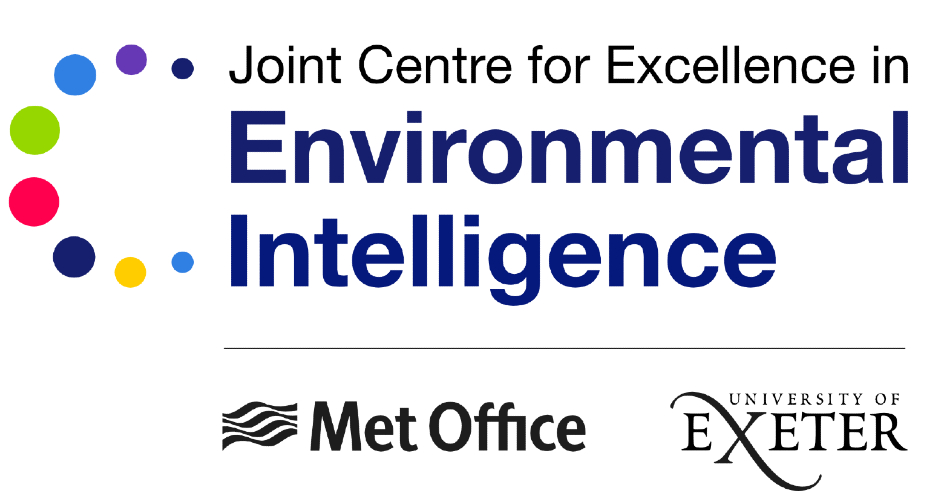Masters applications for 2023 entry are now closed.
Applications for September 2024 will open on Monday 25 September. Applications are now open for programmes with a January 2024 start. View our programmes »
Overview
- Environmental Intelligence is the integration of environmental and sustainability research with Data Science, Artificial Intelligence and cutting-edge digital technologies to provide organisations with the meaningful insight required to address the challenges associated with environmental and climate change
- Learn the principles behind a wide variety of Data Science and Artificial Intelligence methods and how to apply them to environmentally related problems and challenges.
- The programme can act as a conversion course, with no prior knowledge of coding, statistics or machine learning assumed, or you can build upon your existing skills and integrate them with environmental knowledge to address challenges associated with climate and environmental change.
- Gain experience with a variety of languages essential to Data Science and Artificial Intelligence, including R and Python, and how to work with a range of data formats and structures.
- Learn how to extract Environmental Intelligence from data, providing the information and insight that is required across critical sectors including energy, transportation, agriculture, financial services and healthcare.
- The delivery of the programme is supported by the UK Met Office, with components of teaching and project supervision provided by experts from the Joint Centre for Excellence in Environmental Intelligence.
Environmental Intelligence will transform our understanding of the future impacts of climate and environmental change
Home to the UK’s five most influential climate scientists
The Joint Centre for Excellence in Environmental Intelligence is a pioneering collaboration with the Met Office
Partner to the Alan Turing Institute and home to the Institute of Data Science and Artificial Intelligence
Entry requirements
Successful applicants will usually have at least a 2:1 in their undergraduate degree, but we will consider alternative qualifications and experiences and all applicants are considered on their individual merits.
Applicants must have an A level or equivalent in Mathematics and/or have received quantitative skills training as part of their undergraduate programme or professional experience.
Prior experience of coding is not necessary on this course.
Entry requirements for international students
English language requirements
International students need to show they have the required level of English language to study this course. The required test scores for this course fall under Profile B3. Please visit our English language requirements page to view the required test scores and equivalencies from your country.
Course content
Environmental Intelligence is the integration of Environmental and sustainability research with Data Science, Artificial Intelligence and cutting-edge digital technologies to provide organisations with the meaningful insight required to address the challenges associated with environmental and climate change.
We will provide you with training in the three core components of Environmental Intelligence: data science and artificial intelligence, environmental challenges, and the use of data in society. Core modules introducing data science, statistical modelling and machine learning will be delivered using environmental examples and will be accompanied by modules covering the communication of data science, ethics and governance.
You will be able to choose from a range of optional modules covering topics such as digital business models, high-performance computing, food systems, business and climate change and innovation and the science-policy interface.
In addition to the taught component of the programme, you will be able to apply your newly developed skills in an extended piece of research allowing you to focus on an area that is of particular interest to you. During this time you will have the opportunity to work directly with experts from across the University of Exeter and, for certain projects, with experts from the Met Office.
The modules we outline here provide examples of what you can expect to learn on this degree course based on recent academic teaching. The precise modules available to you in future years may vary depending on staff availability and research interests, new topics of study, timetabling and student demand.
Compulsory modules
| Code | Module | Credits |
|---|
| MTHM501 | Working with Data | 15 |
| MTHM502 | Introduction to Data Science and Statistical Modelling | 15 |
| MTHM503 | Applications of Data Science and Statistics | 15 |
| MTHM611 | Topics in Environmental Intelligence | 15 |
| SOCM033 | Data Governance and Ethics | 15 |
| MTHM612 | Environmental Intelligence Research Project | 60 |
Optional modules
| Code | Module | Credits |
|---|
| Select 45 credits |
| MTHM505 | Data Science and Statistical Modelling in Space and Time | 15 |
| MTHM506 | Statistical Data Modelling | 15 |
| MTHM507 | Communicating Data Science | 15 |
| MTHM017 | Advanced Topics in Statistics | 15 |
| MTHM054 | Climate Change Science and Solutions | 15 |
| BEM3056 | Business and Climate Change | 15 |
| ECMM426 | Computer Vision | 15 |
| ECMM447 | Social Networks and Text Analysis | 15 |
| ECMM461 | High Performance Computing | 15 |
| GEOM143 | Global Systems Thinking | 15 |
| GEOM149 | Green Planet | 15 |
| GEOM180 | Environmental Remote Sensing | 15 |
| GEOM184 | Open Source GIS | 15 |

The JCEEI Team

Dr James Salter
Lecturer in Statistics (Data Science/Environmental Intelligence)
The JCEEI Team
This programme is affiliated with the JCEEI, which brings together world-leading researchers from the University of Exeter and the Met Office, to pioneer the development of Environmental Intelligence research and deliver innovative, interdisciplinary education and training. Various JCEEI staff will be involved in teaching and project supervision.
Profile page
Dr James Salter
Lecturer in Statistics (Data Science/Environmental Intelligence)
James is part of the JCEEI, with interests in emulating and history matching (calibrating) computer models with high-dimensional input and output spaces, discrepancies between models and observations, environmental modelling and communicating uncertainty.
Profile page
Fees
2024/25 entry
UK fees per year:
£13,700 full-time
International fees per year:
£29,100 full-time
Please note: For certain projects, students may have the opportunity to conduct research projects in collaboration with a supervisor from the Met Office and therefore may incur some additional, minimal, travel costs.
Office for Students Data Science Scholarship 2024
Eligible students from under-represented groups in the data science and AI sectors can apply for one of 16 £10,000 grants funded by the Office for Students (OfS) Data Science Scholarship. The scholarships are part of the OfS nationwide drive to expand access to this dynamic sector for women, students of colour, those with disabilities and those from lower socioeconomic backgrounds.
Find out more about this scholarship and apply here.
Scholarships
We invest heavily in scholarships for talented prospective Masters students. This includes over £5 million in scholarships for international students, such as our Global Excellence Scholarships*.
For more information on scholarships, please visit our scholarships and bursaries page.
*Selected programmes only. Please see the Terms and Conditions for each scheme for further details.
Teaching and research
Teaching and assessment
The programme will include the application of Data Science and Artificial Intelligence across a wide variety of sectors related to the environment and will help you develop innovative and responsible approaches to the use of data. You will cover the entire spectrum of Data Science from collection through to interrogation and analysis, interpretation, visualisation and communication.
You will cover a range of topics within Environmental Intelligence such as data formats and wrangling; data integration and fusion, numerical and stochastic models; statistical modelling, machine learning and AI; climate change; clean air, extreme weather events, energy and net zero.
Teaching on this programme is delivered through a mix of lectures, projects, group work and innovative hands-on lab sessions. Many of your lectures will be interactive, combining a blend of classroom learning, coding and data analysis. Group and individual projects will be undertaken using real data and will focus on environmental challenges across from current research, industry and policymaking.
You will gain the skills to be able to fully utilise Data Science and Artificial Intelligence in addressing the challenges associated with environmental and climatic change through a truly inter-disciplinary delivery of environmental and technical knowledge, together with the use of environmental intelligence in practice.
The Joint Centre for Excellence in Environmental Intelligence (JCEEI)
This programme is affiliated with the JCEEI, which brings together world-leading researchers from the University of Exeter and the Met Office, to pioneer the development of Environmental Intelligence research and deliver innovative, interdisciplinary education and training. JCEEI staff will be involved in the delivery of teaching and supervising projects.
The Alan Turing Institute
We are partnered and work closely with the Alan Turing Institute, the UK’s national centre for Data Science and Artificial Intelligence. The University of Exeter leads the Environment and Sustainability Turing Special Interest Group, with over 300 members, enabling networking with the UK’s leading researchers.
Research
We believe every student benefits from being taught by experts active in research and practice. All our academic staff are active in internationally-recognised scientific research across a wide range of topics including, data science, statistics, artificial intelligence, environment, biodiversity and sustainability. You will discuss the very latest ideas, research discoveries and new technologies, becoming actively involved in a research project yourself.
Read more
Careers
Employer-valued skills this course develops
You will gain the skills to be able to fully utilise Data Science and Artificial Intelligence in addressing the challenges associated with environmental and climatic change through a truly inter-disciplinary delivery of environmental and technical knowledge, together with the use of environmental intelligence in practice.
You will develop the skills in Data Science and Artificial Intelligence, together with environmental knowledge, which will be key to success in both government and business and developing sustainable interactions with the natural environment.
Career paths
Our interaction with the natural environment plays a crucial role in all aspects of society: our health, wealth, safety and future prosperity. Environmental and climate change, and the need to transition to a Net Zero economy, means businesses and governments will need access to decision-critical information on the environment to survive and thrive.
Environmental Intelligence solutions will become business-critical across many sectors, including energy, transportation, agriculture, critical infrastructure, telecommunications and healthcare.
Project placements
For certain projects, you may have the opportunity to conduct your research project in collaboration with a supervisor from the Met Office.
Careers services
We have a dedicated Careers Service for additional information on their services. ensuring you have access to careers advisors, mentors and the tools you need to succeed in finding employment in your chosen field on graduation. We offer the Exeter Award and the Exeter Leaders Award which include employability-related workshops, skills events, volunteering and employment which will contribute to your career decision-making skills and success in the employment market. Our graduates compete very successfully in the employment market, with many employers targeting the University when recruiting new graduates.
Read more














